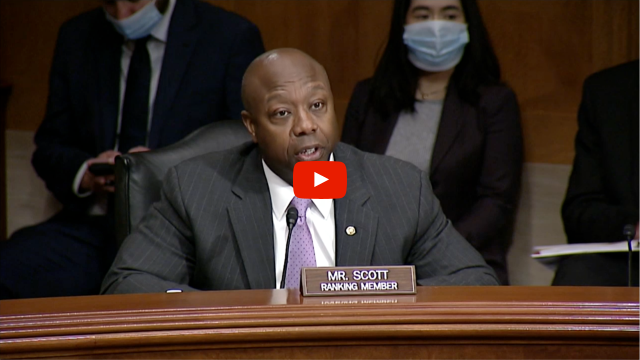Ranking Member Scott, Aging Committee Members Hold Hearing on Disaster Management
WASHINGTON – This week, U.S. Senate Special Committee on Aging Ranking Member Tim Scott (R-S.C.), along with Chairman Bob Casey (D-Pa.), held a hearing titled “Inclusive Disaster Management: Improving Preparedness, Response, and Recovery.” Throughout the hearing, witnesses and members examined the effects of natural disasters and public health emergencies on older adults and people with disabilities.

Click to watch Ranking Member Scott’s opening remarks
On his disaster prevention work … “The first step in effective disaster management is, of course, prevention. That is why I introduced bipartisan legislation with Senator Schatz from Hawaii, the [Repeatedly] Flooded Communities Preparation Act. This seeks to provide more resources to those areas of our nation that consistently, continuously flood. … The legislation would break the costly cycle of repeated flooding and rebuilding by providing our communities with the tools to take proactive steps to reduce flood risk and safeguard homes and businesses.”
On his disaster response work … “[E]ven the best preparation cannot stop every disaster. … That’s why I introduced the [FEMA Empowering Essential Deliveries] FEED Act, with Senator Murphy from Connecticut. I’m very thankful that our chairman has joined the FEED Act. The FEED Act would increase food security for older Americans and others during emergencies by opening up a pathway for food producers, restaurants, and non-profits to partner with their state and local governments to meet the needs on the ground. It’s through reforms like the FEED Act that we are able to assist local communities in the midst of a disaster.”
On his disaster recovery work … “In South Carolina, as in many southern states, heirs’ property is passed down by inheritance. In the wake of disasters, FEMA regulations reflected unjust discrimination against those heirs who are disproportionately poor and minorities because they simply can’t afford to clear the titles. These homeowners had been ruled ineligible for the disaster assistance they should receive. …
“In August, Senator Ossoff and I sent a letter to Homeland Security Secretary Mayorkas urging FEMA to review and revise its practices. As a result, FEMA changed its policies in September. FEMA will now accept a broader range of documentation to prove homeownership and occupancy, such as receipts for home repairs or improvements, a long overdue correction of something that’s simply not right.”
Providing testimony was Randy Creamer, Vice Chairman of South Carolina Voluntary Organizations Active in Disaster (SCVOAD).
.png)
Click to watch Mr. Creamer’s testimony
On his disaster relief work … “The South Carolina Baptist Convention became involved in disaster relief in 1990 following Hurricane Hugo. Today we have 2,500 volunteers who have attended our training, completed background checks as a part of our credentialing process, and prepared to assist others affected by disasters in South Carolina, across the U.S., and occasionally even internationally. … Our primary task is to provide immediate assistance after various wind events, like tornadoes or hurricanes or thunderstorms or flood events that can occur after a tropical system or some heavy rain event. … Another major task is to partner with The Salvation Army and the American Red Cross when mass feeding is required to support those who have been evacuated and support those who are unable to prepare meals for themselves.”
On disaster relief lessons he has learned … “Over the years, we’ve learned a number of critical lessons. We’ve learned that disaster impacts increase substantially on structures and houses that have pre-existing deferred maintenance issues. We’ve also learned that we can’t do everything; you have to find your niche and really do it well. We’ve learned that we can’t help everyone; we have to prioritize and identify the most vulnerable. Our priority is on those who are unable to help themselves, they lack financial resources, or have no one else to help them. … We also strive to help our body of first responders that are often neglecting their own personal needs and family needs because they’re serving the community. And finally, we’ve learned that we have to allow our volunteers a great deal of lee-way in the way that they respond.”
###